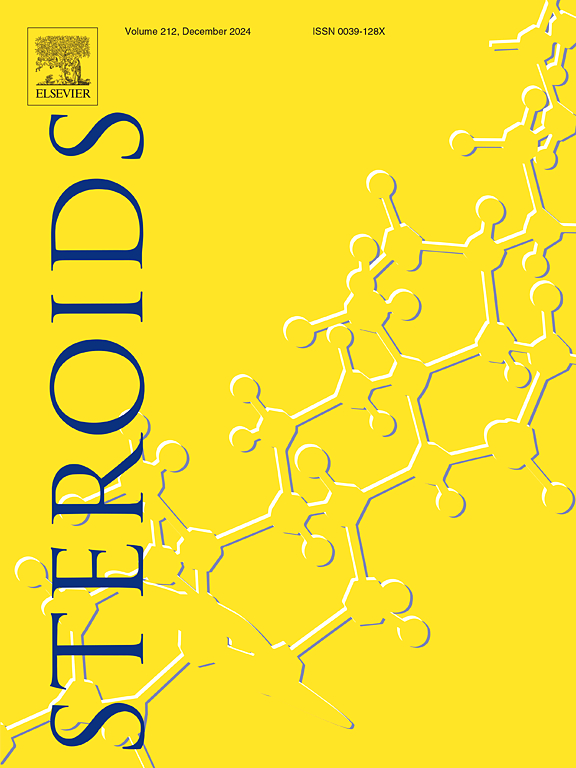Roles of equol and the PI3K/Akt signaling pathway in the cardioprotective effects of enteral daidzein against ischemia–reperfusion injury in isolated rat hearts
IF 2.1
4区 医学
Q4 BIOCHEMISTRY & MOLECULAR BIOLOGY
引用次数: 0
Abstract
Purpose
Daidzein, a soy-derived phytoestrogen, administered directly in the heart does not show cardioprotective effects against myocardial ischemia–reperfusion (IR) in isolated rat hearts. This study aimed to investigate whether cardioprotective effects of enteral daidzein against myocardial IR are promoted by equol, a metabolite of daidzein, through phosphatidylinositol 3-kinase/protein kinase B (PI3K/Akt) signaling pathway.
Methods
Two experiments involving the Langendorff system were performed. During experiment 1, rats were divided into: daidzein group received 100 mg/kg of daidzein and control group received saline enterally 24 h before heart excision. After the rats were euthanized, blood samples were obtained to measure equol levels. Hearts were perfused with modified Krebs-Henseleit (KH) buffer before and after no-flow ischemia. During experiment 2, rats were divided into daidzein + WT (wortmannin) and control + WT groups, where daidzein (100 mg/kg) or saline (control + WT) was administered enterally 24 h before heart excision. To assess the role of the PI3K/Akt signaling pathway, an inhibitor of PI3K (wortmannin) was administered before and after no-flow ischemia in both groups. The primary outcome was the maximum left ventricular pressure derivative (LV dP/dt max) after reperfusion.
Results
LV dP/dt max values of the daidzein group at 10, 15, and 20 min after reperfusion were significantly higher than those of the control group (P < 0.05). This effect was diminished by wortmannin. Enteral daidzein significantly increased serum equol levels (daidzein group: 541.5 ± 330.8 nmol/L; control group: 140.6 ± 43.3 nmol/L; P = 0.0043).
Conclusion
Enteral daidzein exhibited cardioprotective effects via PI3K/Akt signaling pathway activation, probably induced by increased serum equol level.
马雌酚和PI3K/Akt信号通路在肠内大豆苷元对离体大鼠心脏缺血再灌注损伤的心脏保护作用中的作用
目的大豆黄素是一种大豆来源的植物雌激素,直接给药对离体大鼠心肌缺血-再灌注(IR)没有心脏保护作用。本研究旨在探讨大豆苷元代谢产物马雌酚是否通过磷脂酰肌醇3-激酶/蛋白激酶B (PI3K/Akt)信号通路促进肠内大豆苷元对心肌IR的心脏保护作用。方法采用Langendorff体系进行两项实验。实验1将大鼠分为:大豆苷元组在心脏切除前24 h给予大豆苷元100 mg/kg,对照组给予生理盐水。在对大鼠实施安乐死后,采集血液样本来测量雌马酚水平。在无血流缺血前后用改良的Krebs-Henseleit (KH)缓冲液灌注心脏。实验2将大鼠分为大豆苷元+ WT (wortmannin)组和对照组+ WT组,在心脏切除前24 h肠内给予大豆苷元(100 mg/kg)或生理盐水(对照组+ WT)。为了评估PI3K/Akt信号通路的作用,两组小鼠在无血流缺血前后均给予PI3K抑制剂wortmannin。主要终点是再灌注后的最大左室压导数(LV dP/dt max)。结果黄豆苷元组在再灌注后10、15、20 min的slv dP/dt max值均显著高于对照组(P <;0.05)。wortmannin减少了这种效果。肠内大豆苷元显著提高血清雌马酚水平(大豆苷元组:541.5±330.8 nmol/L;对照组:140.6±43.3 nmol/L;p = 0.0043)。结论肠内大豆苷元通过激活PI3K/Akt信号通路发挥心脏保护作用,可能与血清雌马酚水平升高有关。
本文章由计算机程序翻译,如有差异,请以英文原文为准。
求助全文
约1分钟内获得全文
求助全文
来源期刊

Steroids
医学-内分泌学与代谢
CiteScore
5.10
自引率
3.70%
发文量
120
审稿时长
73 days
期刊介绍:
STEROIDS is an international research journal devoted to studies on all chemical and biological aspects of steroidal moieties. The journal focuses on both experimental and theoretical studies on the biology, chemistry, biosynthesis, metabolism, molecular biology, physiology and pharmacology of steroids and other molecules that target or regulate steroid receptors. Manuscripts presenting clinical research related to steroids, steroid drug development, comparative endocrinology of steroid hormones, investigations on the mechanism of steroid action and steroid chemistry are all appropriate for submission for peer review. STEROIDS publishes both original research and timely reviews. For details concerning the preparation of manuscripts see Instructions to Authors, which is published in each issue of the journal.
 求助内容:
求助内容: 应助结果提醒方式:
应助结果提醒方式:


